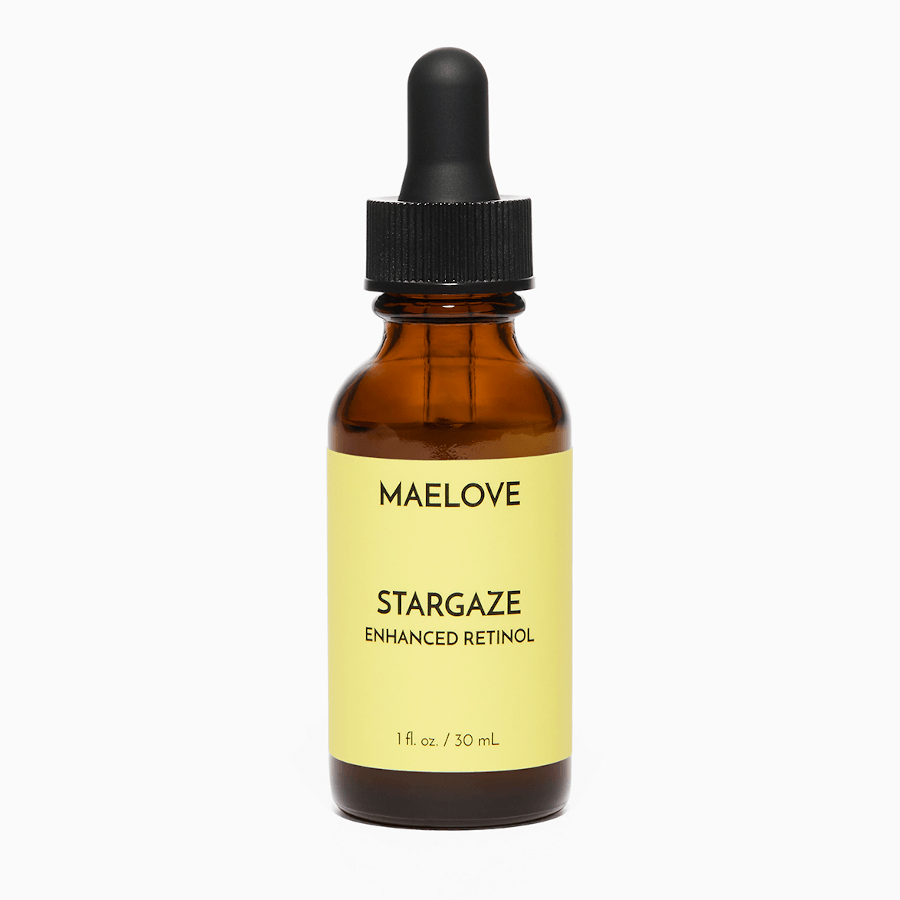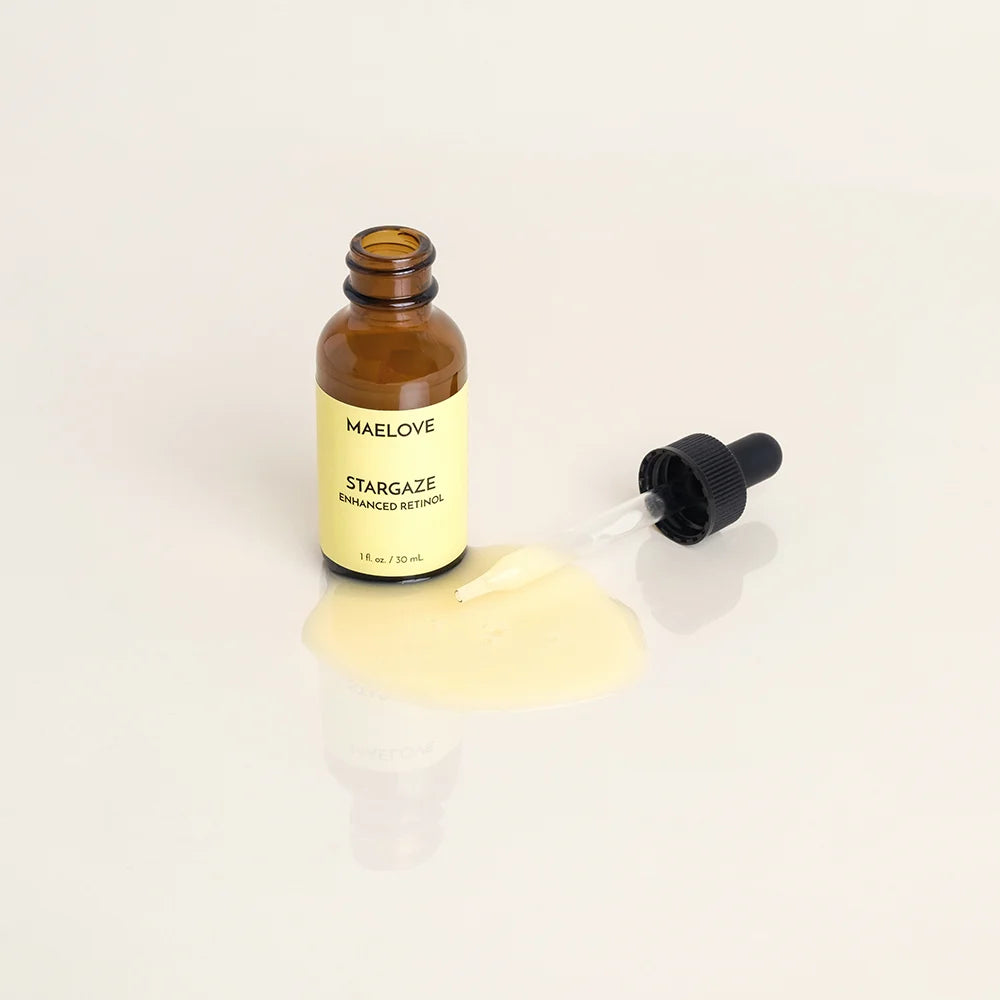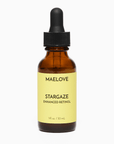
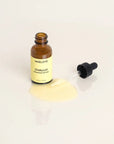
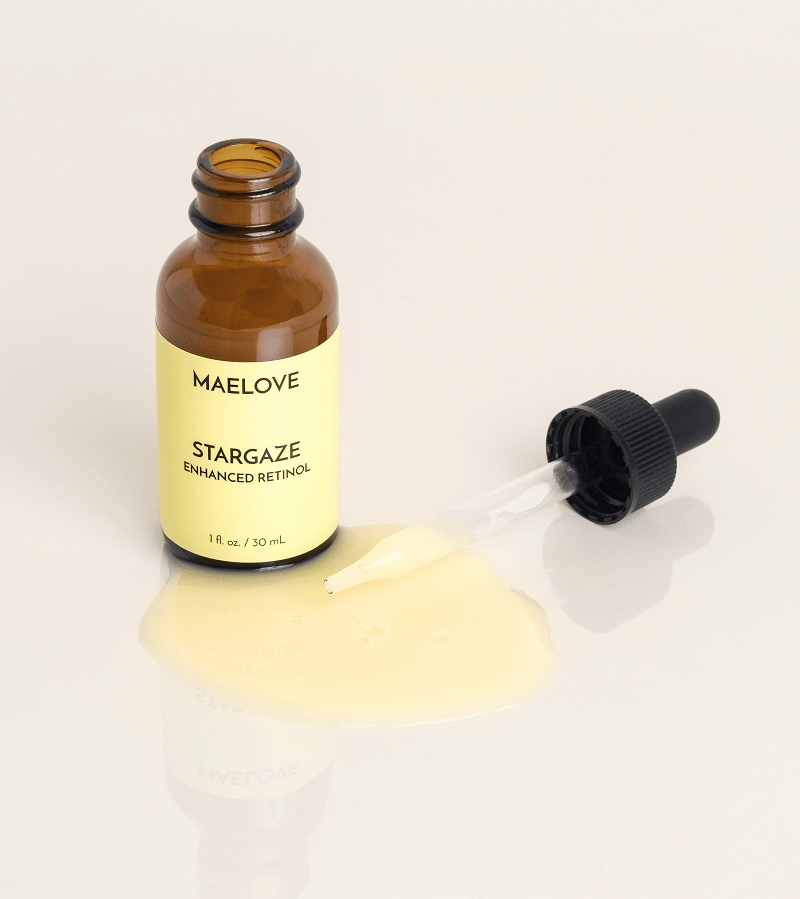
OBSESSIVELY FORMULATED
Stargaze features a proprietary time-released 0.25% retinol system that disperses the anti-aging benefits over time for minimal irritation, making it ideal for those who are new to retinoids or with extra sensitive skin.
As the top dermatologist-recommended ingredient to fight signs of aging, this beginner retinol serum helps to ease your skin into retinol usage as you gently work your way up to a stronger level. (Once your skin can tolerate Stargaze nightly, it is time to graduate to Moonlight Retinal Super Serum!)
To further minimize irritation, we pair our encapsulated retinol with a complex of hydrating and calming boosters, including hyaluronic acid, niacinamide, and a soothing botanical blend of aloe, myrtle leaf, ginseng, grape, and white tea extracts.
Retinoids are the #1 anti-aging ingredient
- Increases production of collagen, elastin, and blood flow to firm skin and correct fine lines
- Enhances cellular turnover to improve skin texture, resulting in smoother and more radiant skin
- Reduces hyperpigmentation and dark spots, evening out skin tone and reducing dullness
Time-released 0.25% retinol allows easy acclimation to retinoids
- Slow-dispersing retinol is ideal for beginners or those with extra-sensitive skin
- Hydrating, soothing ingredients like hyaluronic acid, niacinamide, and witch hazel water minimize irritation
- Anti-inflammatory botanical blend of aloe, grape seed, ginseng, and white tea calms skin
Additional acne-fighting benefits
- Regulates sebum production and promotes the shedding of dead skin cells to help manage breakouts
- Reduces redness commonly associated with acne.
For PM use only. Apply a thin layer of serum to the face, neck, and chest. Massage product in until it is fully absorbed. Follow with a gentle moisturizer to lock in the serum.
Start slow – use 2-3 nights a week at first until skin is adjusted before ramping up to daily use. Eventually work up to nightly use and layer with other products if tolerated.
Layer your products from thinnest to thickest in texture, waiting a full minute between each product.
Retinoids are not recommended during pregnancy or nursing. Instead, we recommend using our Night Renewer glycolic acid cream or Peptide Squad collagen renewal serum. Always double check ingredients with your doctor and follow their protocol.
Key Ingredients
Retinol (0.25%)
Supporting Ingredients
Hyaluronic Acid, Witch Hazel Water, Niacinamide, Aloe Barbadensis Leaf Juice Powder, Hydrolyzed Myrtus Communis (Myrtle) Leaf Extract, Withania Somnifera (Indian Ginseng) Root Extract, Vitis Vinifera (Grape) Seed Extract, Camellia Sinensis (White Tea) Leaf Extract
All Maelove products are safe for sensitive skin, made in the US, vegan, cruelty-free, non-comedogenic, gluten-free, and free of parabens, phthalates, dyes, and artificial fragrances. We don't use ingredients that are banned in the EU or in the USA.
Show all ingredients
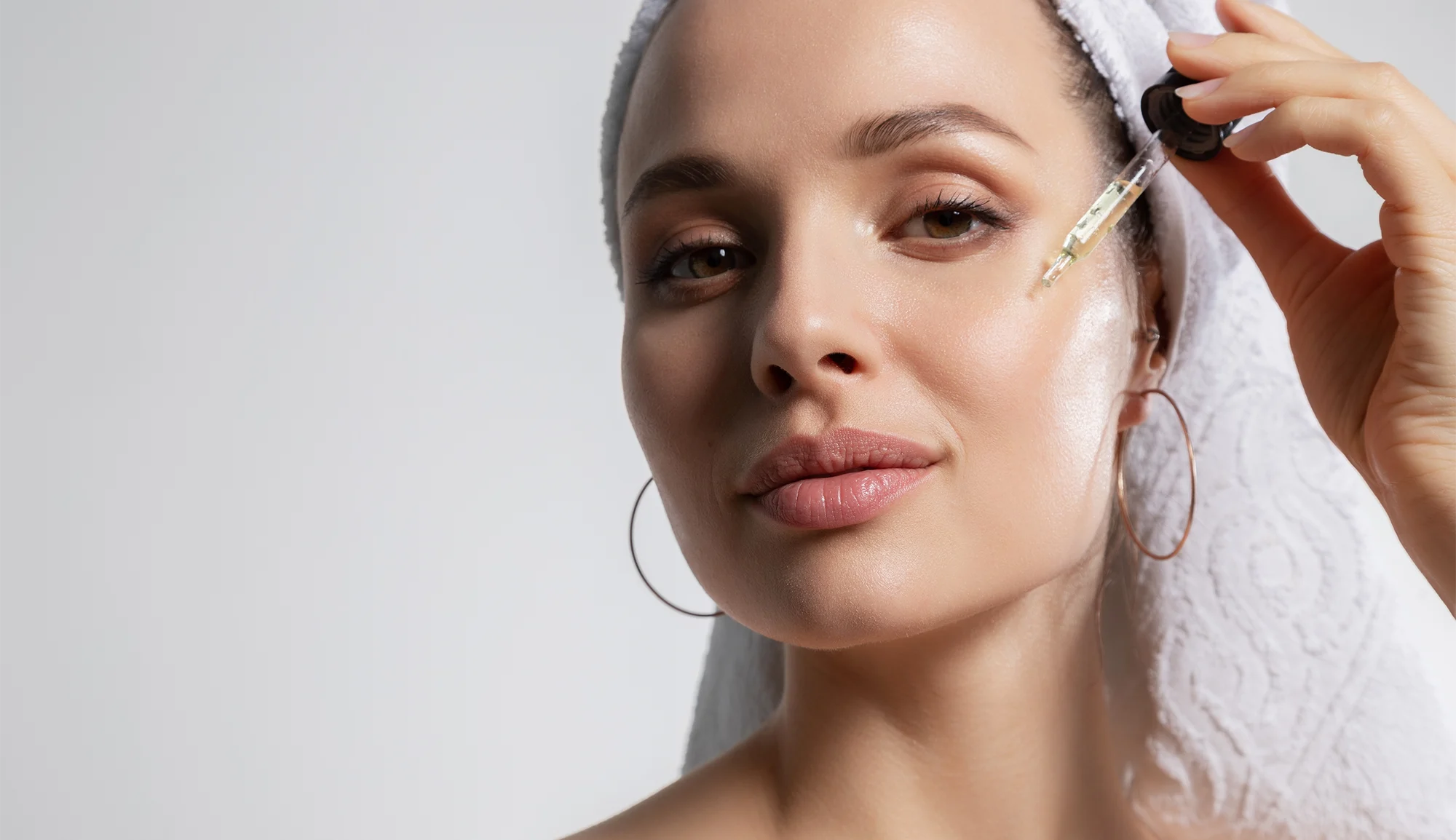
This writeup was lead-authored by our senior technical adviser, Sunbin Song, PhD. Sunbin graduated from MIT with a degree in Biology before receiving a doctorate in neuroscience from Georgetown and...
For the Curious
When speaking about anti-aging ingredients, the number one spot is always taken by retinoids such as retinol, retinal, and tretinoin. Retinoids are well-studied vitamin A related compounds. Retinoids address most of the issues surrounding aging skin. With aging, the skin gets less blood flow (less vascularized), becomes thinner and more lax, and finely lined. Additional photoaging from sun damage results in hyperpigmentation spots, rough patches (actinic keratosis), enlarged pores and deep wrinkles. Topical retinoids have been scientifically shown to help treat every one of these issues because they act on nuclear receptors that regular the activation of many genes in a wide variety of cell types (Mukherjee et al. 2006).
First, retinoids increase blood flow to the skin by increasing endothelial cell proliferation leading to increased vascularity. Second, it thickens the epidermal layer of skin by upregulating the proliferation of skin cells (keratinocytes). Third, it reduces fine lines and wrinkles by upregulating collagen production and other components of the extracellular matrix (ECM) including elastin, fibronectin and glycosaminoglycans (GAGs). It does so by increasing dermal fibroblast activity and decreasing collagenase production. Fourth, retinoids can improve hyperpigmentation and the appearance of pore size by inhibiting melanosome transfer to keratinocytes from melanocytes, and accelerating cell turnover. These patterns of results have been replicated in study after study in aged skin and photoaged skin (Saurat et al. 1994, Kafi et al. 2007, Kong et al. 2015, Shao et al. 2017, Bouloc et al. 2014, Creidi et al. 1998, Leydon et al. 2017, Zasada and Budzisz 2019).
Retinoids are used to treat acne as they normalize abnormal desquamation within the sebaceous follicles and decrease the activity of enzymes involved in sebum production. In fact, when retinoids were first approved by the FDA, they were approved for the treatment of acne in 1971 and it wasn’t until 1995 that the FDA approved usage for sun-damaged, prematurely aged skin. Other retinoids used for acne treatment today often by prescription only include tretinoin (retinoic acid or Retin-A), isotretinoin (Accutane), adapalene (Differin), and Tazarotene (Tazorac) (Mukherjee et al. 2006).
Unlike ingredients that work like hydroquinone (such as arbutin, kojic acid, and licorice root extract in Fade Away serum), retinoids do not target the tyrosinase enzyme which makes melanin (skin pigment). Ingredients like hydroquinone are often called ‘lightening agents.’ In contrast, retinoids even out skin tone by inhibiting melanosome (think sacs that contain melanin) transfer to keratinocytes (skin cells) from melanocytes (cells that make melanin). They also help accelerate the rate at which your skin cells renew allowing dark spots to fade faster (Leydon et al. 2017, Zasada and Budzisz 2019).
Ideally when treating hyperpigmentation, retinoids should be included in combination with other agents. It has been scientifically shown that retinoids in combination with ‘lightening agents’ such as hydroquinone or arbutin, retinoids in combination with vitamin C, and retinoids in combination with glycolic acid works better than any of these agents used alone (Mukherjee et al. 2006).
All retinoids are eventually converted into retinoid acid in order to have their anti-aging benefits. Tretinoin (retinoic acid) is considered the most potent anti-aging retinoid as retinoic acid directly binds to retinoic acid receptors in the nucleus of cells. In contrast, retinal relies on an enzyme inside the skin cell to convert it into retinoic acid and retinol relies on an additional enzyme to convert it into retinal which then is converted into retinoic acid. The conversion of retinol to retinal is slow and inefficient, making retinol is 10 to 20 times less potent than retinoic acid. In contrast, the conversion of retinal into retinoic acid is fast and efficient giving retinal almost the same level of potency as tretinoin (Saurat et al. 1994, Sorg et al. 2006, Belyaeva et al. 2020).
Many find tretinoin intolerable. This is partly related to its potency but also due to irritation unique to tretinoin including the presence of a carboxylic acid which leads to skin surface irritation that drives reddening. Tretinoin also activates TRP receptors that leads to a burning sensation (Luo et al. 2013, Fluhr et al. 1999, Mukherjee et al. 2006). For this reason, we generally recommend retinal that has almost the same potency as tretinoin but without these additional sources of irritation.
However, weaker retinol may be preferable to these higher potency retinoids, particularly for those who are new to retinoids. When the skin is becoming acclimated to retinoids, skin scaling (peeling/flaking) and the resulting loss of skin barrier function (which leads to dry and irritated skin) can occur due to the sudden increase in skin cell turnover. As the skin renews and re-normalized (which can take a few weeks to a few months), this particular source of irritation dissipates (Fluhr et al. 1999). For some, this acclimation period may prove to be unbearable. In this instance, a retinol product such as Stargaze can ease the skin through this period allowing for a smoother transition to a higher strength product such as our retinal serum Moonlight.
Those with very sensitive skin may even find even weaker retinol hard to tolerate. Stargaze features time-released retinol that allows for very gentle dispersion of retinol so that even those with the most sensitive skin can find this product tolerable. Co-formulation with hydrating and soothing ingredients further help this tolerability. Hence, for those who have struggled to find a tolerable retinoid product, Stargaze may provide this solution.
Retinoids start working right away and even after seven days, there are significant changes underneath the skin that can be visualized with special equipment. However, in order for there to be a noticeable difference in the appearance of wrinkles and overall skin texture, it typically takes four to six weeks with high potency retinoids such as Moonlight, and up to eight weeks with lower potency retinoids such as Stargaze. To learn more, consult our blog article.
The sudden increase in cell turnover introduced by all retinoids can be particularly irritating in the first few months as the skin gets acclimated. This can result in skin scaling (peeling/flaking) and the resulting loss of skin barrier function (which leads to dry and inflamed skin) (Fluhr et al. 1999). Time-released retinol allows for the most gentle introduction to retinoids and this initial period.
To mitigate the potential dryness, we include hydrating ingredients (hyaluronic acid, glycerin) and skin soothing ingredients (niacinamide, witch hazel water) that help with the potential dryness and redness. An anti-inflammatory botanical blend that includes aloe, grade seed, myrtle leaf, white tea and ginseng further help manage the potential inflammation and redness associated with retinoids. These co-formulated ingredients make Stargaze even easier to tolerate for those new to retinoids and those with even the most sensitive skin.
Yes and in fact we recommend it. However, you should check the brand and make sure. All Maelove serums are designed so that they can be used together. While AM use is preferred for Glow Maker vitamin C serum, it can also be used in the PM if using twice daily. Apply Glow Maker first and then Stargaze. If you would like to learn more, consult our blog article.
No. Topical Retinoids are deemed unsafe to use while pregnant due to risk of birth defects from systemic absorption, i.e. your bloodstream. Maelove offers other powerful anti-aging serums that are safe for use during pregnancy and lactation and these include Night Renewer, Glow Maker, NIA 10 or Peptide Squad serum. If you want to learn more, please check out the following blog article.
Bouloc A, Vergnanini AL, Issa MC (2014). “A double-blind randomized study comparison the association of Retinol and LR2412 with tretinoin 0.025% in photoaged skin.” J Cosmetic Dermatol, 14, 40-46.
Creidi P, Vienne MP, Ochonisky S, Lauze C, Turlier V, Lagarde JM, Dupuy P (1998). “Profilometric evaluation of photodamage after topical retinalydehyde and retinoic acid treatment.” J Am Acad Dermatol 39: 960-965.
Kafi R, Kwak HSR, Schumacher WE, Cho S, Hanft VN, Hamilton TA, King AL, Neal JD, Varani J, Fisher GJ, Voorhees JJ, Kang S (2007). “Improvement of Naturally Aged Skin with Vitamin A (Retinol)” Arch Dermatol 143: 606-612.
Kong R, Cui Y, Fisher GJ, Wang X, Chen Y, Schneider LM, Majmudar G (2015). “A comparative study of the effects of retinol and retinoic acid on histological, molecular, and clinical properties of human skin.” J Cosmetic Dermatol 15: 49-57.
Leydon J, Stein-Gold L, Weiss J (2017). “Why topical retinoids are mainstay of therapy for acne.” Dermatol Ther (Heidelb) 7: 293-304.
Mukherjee S, Date A, Patravale V, Korting HC, Roeder A, Weindl G (2006). “Retinoids in the treatment of skin aging: an overview of clinical efficacy and safety.” Clinical Interventions in Aging. 1(4) 327-348.
Saurat JH, Didierjean L, Masgrau E, Piletta PA, Jaconi S, Chatellard-Gruaz D, Gumowski D, Masouye I, Salomon D, Siegenthaler G (1994). “Topical Retinaldehyde on Human Skin: Biologic Effects and Tolerance.” J Invest Dermatol 103:770-774.
Shao Y, He T, Fisher GJ, Voorhees JJ, Quan T (2017). “Molecular basis of retinol anti-aging properties in naturally aged human skin in vivo.” Int J Cosmet Sci. 39(1): 56-65.
Zasada M and Budzisz E (2019). “Retinoids: active molecules influencing skin structure formation in cosmetic and dermatological treatments.” Adv Dermatol Allergol XXXVI(4): 392-397.
Mukherjee S, Date A, Patravale V, Korting HC, Roeder A, Weindl G (2006). “Retinoids in the treatment of skin aging: an overview of clinical efficacy and safety.” Clinical Interventions in Aging. 1(4) 327-348.
Leydon J, Stein-Gold L, Weiss J (2017). “Why topical retinoids are mainstay of therapy for acne.” Dermatol Ther (Heidelb) 7: 293-304.
Mukherjee S, Date A, Patravale V, Korting HC, Roeder A, Weindl G (2006). “Retinoids in the treatment of skin aging: an overview of clinical efficacy and safety.” Clinical Interventions in Aging. 1(4) 327-348.
Zasada M and Budzisz E (2019). “Retinoids: active molecules influencing skin structure formation in cosmetic and dermatological treatments.” Adv Dermatol Allergol XXXVI(4): 392-397.
Belyaeva OV, Adams MK, Popov KM, Kedishvili NY (2020). “Generation of Retinaldehyde for Retinoic Acid Biosynthesis.” Biomolecules. 10(5). doi:10.3390/biom10010005.
Fluhr JW, Vienne MP, Lauze C, Dupuy P, Gehring W, Gloor M (1999). “Tolerance Profile of Retinol, Retinaldehyde and Retinoic Acid under Maximized and Long-term Clinical Conditions.” Dermatology 199(suppl1): 57-60
Luo J, Clark R, Yang Q, Du G, Zhou S, Yu W, Qian A, Walters E, Carlton S, Hu H (2013). “Retinoids activate the irritant receptor TRPV1 and produce sensory hypersensitivity.” The Journal of clinical investigation DOI:10.1172/JCI66413
Mukherjee S, Date A, Patravale V, Korting HC, Roeder A, Weindl G (2006). “Retinoids in the treatment of skin aging: an overview of clinical efficacy and safety.” Clinical Interventions in Aging. 1(4) 327-348.
Saurat JH, Didierjean L, Masgrau E, Piletta PA, Jaconi S, Chatellard-Gruaz D, Gumowski D, Masouye I, Salomon D, Siegenthaler G (1994). “Topical Retinaldehyde on Human Skin: Biologic Effects and Tolerance.” J Invest Dermatol 103:770-774.
Sorg O, Antille C, Kaya G, Saurat JH (2006). “Retinoids in cosmeceuticals” Dermatologic Therapy 19, 289-296.
Fluhr JW, Vienne MP, Lauze C, Dupuy P, Gehring W, Gloor M (1999). “Tolerance Profile of Retinol, Retinaldehyde and Retinoic Acid under Maximized and Long-term Clinical Conditions.” Dermatology 199(suppl1): 57-60
